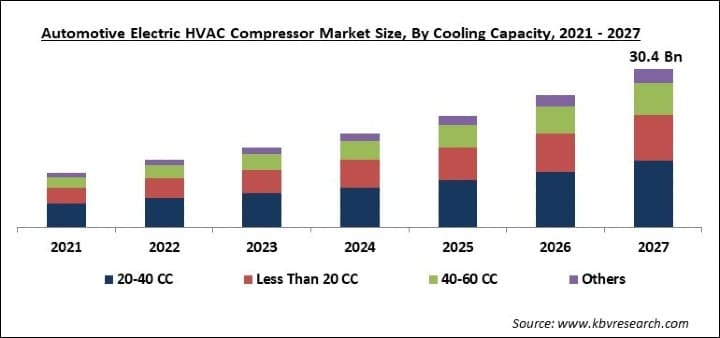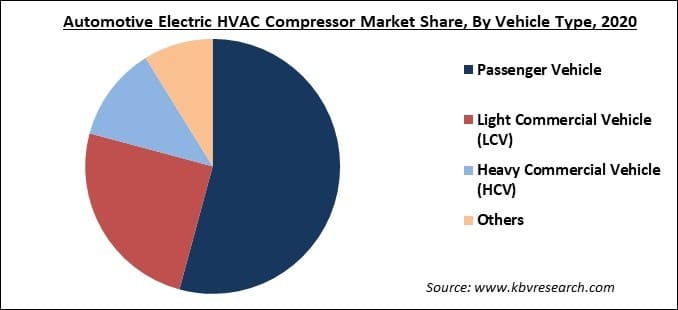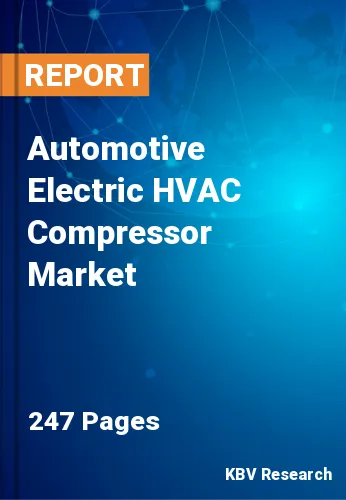The Global Automotive Electric HVAC Compressor Market size is expected to reach $30.4 Billion by 2027, rising at a market growth of 19.4% CAGR during the forecast period. Electric compressor plays crucial functions in an electric vehicle in comparison to the traditional compressor in an ICE vehicle. In an electric vehicle, the compressor is required to perform the cooling of the complete cabin and the battery pack.
Electric compressor is beneficial in protecting the battery from overheating and eventually the vehicle from collapsing. Therefore, an electric HVAC compressor is considered as a crucial part of the complete functioning of an electric vehicle. The adoption of electric vehicles has been fueled by the growing fuel costs along with the rising awareness regarding environmental protection, thereby augmenting the demand for electric HVAC compressors.

Though, the growth of the automotive electric HVAC compressor market would be hampered by the huge initial costs and maintenance costs related to the electric HVAC compressors. The implementation of electric HVAC compressors includes heavy-duty electric wiring, which eventually surges the overall cost of the system. Repairs and maintenance of electric compressors is also a complicated task needing optimum level expertise, hence increasing the overall cost.
In addition to it, the demand for electric vehicles is directly proportional to the sales of electric compressors. Though, the sales of electric vehicles are going through a decline phase due to the huge cost and range anxiety related to electric vehicles. However, the consumers would be encouraged to choose electric vehicles due to the factors like technological advancements, the introduction of new products, and the constant implementation of electric chargers and charging stations, hence boosting the demand for electric HVAC compressors during the forecast period.
The outbreak of the COVID-19 pandemic has adversely affected the global automotive industry. In addition to it, it is expected that the automotive sector will require at least 4 years to completely recover and run according to the regular business norms. Such possibilities are acting as barriers for stakeholders in the automotive AC compressor market.
Players operating in the global automotive AC compressor market are embracing the plug-and-play method in order to adapt to the gradual growth in the global industry. Car manufacturers are forced to enhance their focus on electric vehicles (EV) due to the changing demand and supply scenario. This is because customers are getting more aware of their expenditures and willing to make a long-term investment to procure different kinds of goods and commodities.
Based on Vehicle Type, the market is segmented into Passenger Vehicle, Light Commercial Vehicle (LCV), Heavy Commercial Vehicle (HCV) and Others. In 2020, the passenger vehicle segment obtained the maximum revenue share of the automotive electric HVAC compressor market. Electric compressors are highly deployed to enhance the range of passenger vehicles, manufacturing of which is increasing substantially.

Based on Drivetrain, the market is segmented into Hybrid Electric Vehicles (HEV), Plug-in Hybrid Electric Vehicles (PHEV) and Battery Electric Vehicles (BEV). The hybrid electric vehicles segment garnered the highest revenue share of the global automotive electric HVAC market because hybrid electric vehicles (HEVs) provide a dual fuel option. Electric compressors are independent of the engine of the vehicle and help in achieving higher fuel efficiency. Due to this, the deployment of electric compressors in HEVs would gain high popularity in the next few years.
Based on Cooling Capacity, the market is segmented into 20-40 CC, Less Than 20 CC, 40-60 CC and Others. In 2020, the less than 20 CC segment procured the second-highest share. This is credited to the installation of these compressors in smaller vehicles. However, compressors that belong to this segment are very small to be deployed in commercial vehicles because of their lesser heat-absorbing capacity. But their deployment would surge due to the increasing popularity of smaller vehicles.
| Report Attribute | Details |
|---|---|
| Market size value in 2020 | USD 9.3 Billion |
| Market size forecast in 2027 | USD 30.4 Billion |
| Base Year | 2020 |
| Historical Period | 2017 to 2019 |
| Forecast Period | 2021 to 2027 |
| Revenue Growth Rate | CAGR of 19.4% from 2021 to 2027 |
| Number of Pages | 247 |
| Number of Tables | 370 |
| Report coverage | Market Trends, Revenue Estimation and Forecast, Segmentation Analysis, Regional and Country Breakdown, Companies Strategic Developments, Company Profiling |
| Segments covered | Vehicle Type, Drivetrain, Cooling Capacity, Type, Region |
| Country scope | US, Canada, Mexico, Germany, UK, France, Russia, Spain, Italy, China, Japan, India, South Korea, Singapore, Taiwan, Brazil, Argentina, UAE, Saudi Arabia, South Africa, Nigeria |
| Growth Drivers |
|
| Restraints |
|
Based on Regions, the market is segmented into North America, Europe, Asia Pacific, and Latin America, Middle East & Africa. Europe obtained the second-highest revenue share in 2020 due to the existence of various automotive OEMs in the region. In addition to it, the acceptance of electric vehicles is increasing substantially across Europe on account of the strict greenhouse gas emission regulations formulated by the EU.
Free Valuable Insights: Global Automotive Electric HVAC Compressor Market size to reach USD 30.4 Billion by 2027
The market research report covers the analysis of key stake holders of the market. Key companies profiled in the report include Denso Corporation, Toyota Industries Corporation, Valeo SA, Aptiv PLC, Panasonic Corporation, Brose Fahrzeugteile SE & Co. KG, BorgWarner, Inc., Hanon Systems (Hahn & Co. Auto Holdings Co., Ltd.), Mahle GmbH (Mahle Stiftung GmbH), and Sanden Holdings Corporation.
By Vehicle Type
By Drivetrain
By Cooling Capacity
By Geography
The automotive electric HVAC compressor market size is projected to reach USD 30.4 Billion by 2027.
Increasing prevalence of cardiovascular diseases are driving the market in coming years, however, Slow commercialization of the PPG biosensors have limited the growth of the market.
Denso Corporation, Toyota Industries Corporation, Valeo SA, Aptiv PLC, Panasonic Corporation, Brose Fahrzeugteile SE & Co. KG, BorgWarner, Inc., Hanon Systems (Hahn & Co. Auto Holdings Co., Ltd.), Mahle GmbH (Mahle Stiftung GmbH), and Sanden Holdings Corporation.
The expected CAGR of the automotive electric HVAC compressor market is 19.4% from 2021 to 2027.
The 20-40 CC segment would display a maximum growth rate during the forecast period.
The Asia Pacific market acquired the largest revenue share in 2020 due to the high adoption rate of electric vehicles in China.
Our team of dedicated experts can provide you with attractive expansion opportunities for your business.

